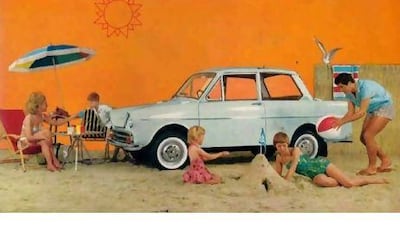Daf Daffodil
This Dutch curiosity boasted a 746cc, two-cylinder engine, 30hp and a Variomatic gearbox with a pulley system that allowed it to go just as fast in reverse as it could in the forward gears. However, "fast" for the Daffodil was a sluggish 29 seconds to hit 80kph. It came in saloon and panel van body types. Manufactured between 1961 and 1963, the export version of this car was sold as the Daffodil, but in the Dutch and German markets, it was sold under the not-quit-as-florally-named Daf 30.
Clan Clover
The British Clan company began life in 1971 with the fibreglass Clan Crusader, which was created by a group of Lotus engineers; production ceased in 1973. After being bought largely by a Cypriot truck manufacturer the company stalled again when Turkey invaded Cyprus, but in 1982 the firm was again revived, this time by a Northern Irish Clan fan. In 1985, the Clover was produced with an Alfa Romeo 1,500cc flat-four engine. Only 20 Clovers were made before the company ceased trading, in June 1987.
Nissan Laurel
In 1968, long before Nissan was making the Leaf, it was producing another car with a plant-based name in the form of the Nissan Laurel. It was a large, swooping saloon car, aimed at being a notch or two above the Bluebird in terms of luxury. Eight generations of the Laurel were produced, until it finally went out of production in 2002. In 1972, the Laurel deviated briefly from its sensible four-door version and a chunky, aggressive coupe influenced by the Ford Torino and Mercury Cougar was made.
Mitsubishi Rosa
The sturdy, practical Mitsubishi Rosa mini-bus is a common sight on the roads of the UAE, usually as a means of transporting workers. It comes in a variety of sizes, from a 16-seater to a 32-seater. The base-model Rosa doesn't have too many bells and whistles, but the extras might plush it up somewhat - these include curtains, a microphone (but only if you get the AM/FM radio-cassette player), the always-classy passenger ashtrays and, alarmingly, optional seat belts.
Triumph Mayflower
Although it was named in honour of the ship that sailed to the US rather than the plant, the Mayflower was a small, two-door saloon of which 35,000 were made in Britain between 1949 and 1953. Its styling, with a boxy rear end and a long bonnet, proved controversial, and Top Gear's James May described it as the ugliest car of all time. Sales figures were disappointing, and after the Mayflower went out of production Triumph didn't produce another small saloon until the Herald, in 1959.

